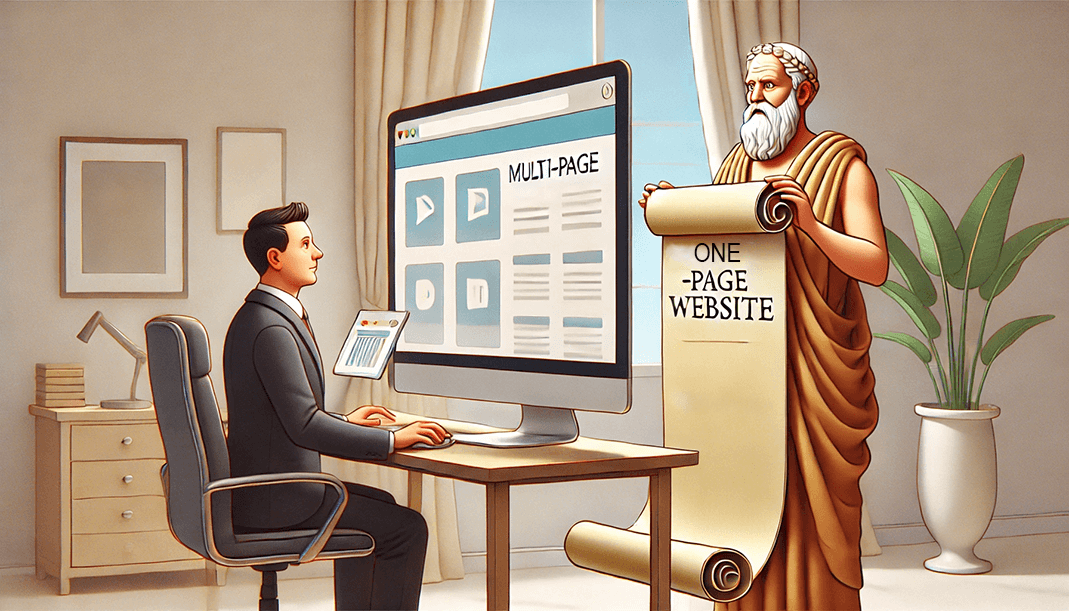
______________________________
Why Choosing the Right Website Structure Matters
The structure of your website plays a crucial role in its success. Whether you choose a multi-page or single-page design impacts how users interact with your content, how well your site ranks in search engines, and its overall scalability. Understanding these differences can help you make an informed decision that aligns with your goals.
When designing a website, one of the first decisions you face is whether to go for a single-page scrolling website or a multi-page structure. Each approach has its own advantages and use cases, but for most businesses, a multi-page website provides better functionality, scalability, and SEO benefits. Let’s dive into the key benefits of having a multi-page website compared to a one-page scrolling site.
1. Enhanced SEO Opportunities
Multi-Page Websites: Each page can be optimized for specific keywords, giving your site multiple opportunities to rank for different search queries. For example, if you run a landscaping business, you can create dedicated pages for "lawn care," "tree trimming," and "hardscaping," each targeting relevant keywords.
Single-Page Websites: SEO is limited because all content resides on one URL. It’s difficult to target multiple keywords effectively, and your ability to rank for diverse queries is constrained.
2. Better User Experience (UX)
Multi-Page Websites: Users can easily find detailed information about specific topics by navigating to dedicated pages. This structure works well for businesses offering various services or products, as it allows visitors to focus on what they’re interested in without being overwhelmed by a large amount of scrolling content.
Single-Page Websites: While scrolling can be visually engaging, it can lead to frustration if users cannot quickly find the information they need. Long scrolls can be especially problematic on mobile devices.
3. Scalability for Future Growth
Multi-Page Websites: As your business grows, it’s easier to add new pages to your site. Whether you’re launching a new service or running a promotional campaign, a multi-page structure can accommodate growth seamlessly.
Single-Page Websites: Expanding content on a single page can make it cluttered and harder to navigate, diminishing the user experience.
4. Faster Loading Times
Multi-Page Websites: Because content is distributed across multiple pages, each page typically loads faster. Visitors can access the specific page they need without waiting for the entire website’s content to load.
Single-Page Websites: All the content must load at once, which can lead to slower performance, especially for media-heavy sites.
5. Stronger Call-to-Actions (CTAs)
Multi-Page Websites: You can strategically place CTAs on relevant pages, guiding users toward a desired action based on the content they’re engaging with. For instance, a "Request a Quote" button on a "Services" page is more effective than having a generic CTA on a single scrolling page.
Single-Page Websites: CTAs may not feel as personalized or relevant because they’re competing with all the other content on the same page.
6. Improved Analytics Insights
Multi-Page Websites: Tools like Google Analytics can provide detailed insights into which pages are performing well, where users drop off, and what content drives conversions. This helps you refine your marketing strategies.
Single-Page Websites: Analytics insights are limited since all actions take place on one page. It’s harder to understand user behavior and make data-driven decisions.
7. Professional Appearance
Multi-Page Websites: A well-organized multi-page site conveys professionalism and attention to detail. For industries like law, healthcare, or real estate, this structure adds credibility.
Single-Page Websites: While they can look modern and sleek, single-page sites may not be perceived as comprehensive or robust for businesses offering a wide range of services.
When a Single-Page Website Might Be the Right Choice
Although multi-page websites offer numerous advantages, there are situations where a single-page website could be appropriate:
Startups or freelancers with minimal content.
Events or product launches where the focus is on a single goal.
Portfolios or creative projects that benefit from a streamlined presentation.
Conclusion
While single-page websites can work well for niche purposes, multi-page websites provide greater flexibility, scalability, and SEO benefits, making them the better choice for most businesses. By structuring your content across multiple pages, you’ll offer a better user experience, improve your site’s search engine performance, and position your business for long-term growth.
Whether you’re starting from scratch or looking to revamp your site, consider how a multi-page structure can enhance your online presence and help you achieve your goals.
Areas Served | Industry Specific Website Design | Privacy Policy | ADA Compliance
Copyright © 1999 - 2025 AldoMedia, LLC. All Rights Reserved.
